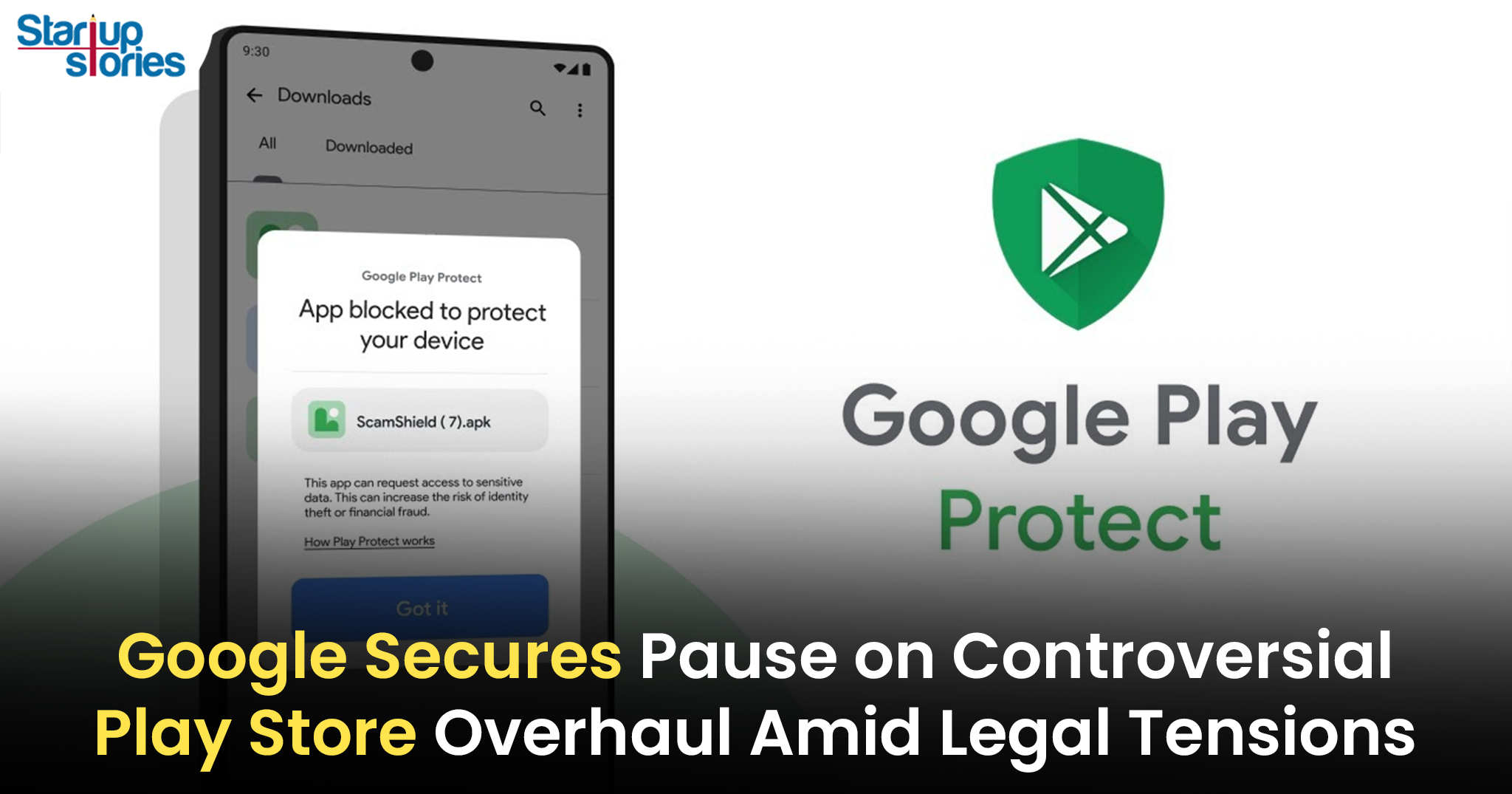Entrepreneur Stories
Federal Judge Grants Google Temporary Pause on Play Store Overhaul Order!

A federal judge in California has agreed to Google’s request to temporarily suspend his order requiring the company to overhaul its Android app store, the Play Store, by November 1. This pause is part of an ongoing antitrust lawsuit initiated by Epic Games, the maker of “Fortnite.”
Judge’s Decision and Background
San Francisco-based U.S. District Judge James Donato made this decision on Friday after Google argued that the injunction issued on October 7 would inflict harm on the company and pose “serious safety, security, and privacy risks” to the Android ecosystem. The delay allows the 9th U.S. Circuit Court of Appeals time to review Google’s separate request for a more extended pause on the judge’s order.
Temporary Relief but Not a Complete Stay
While Judge Donato granted the temporary pause, he denied Google’s request to stay the order throughout the broader appeal process in this case. In response to the ruling, Google stated:
“We’re pleased with the District Court’s decision to temporarily pause the implementation of dangerous remedies demanded by Epic, as the Court of Appeal considers our request to further pause the remedies while we appeal.”
Epic Games’ Response
Epic Games, however, referred to Donato’s ruling as a procedural step and asserted that the court made it clear that Google’s appeal lacks merit. The company accused Google of employing “fearmongering and unsubstantiated security threats” to maintain its control over Android devices and continue charging high fees.
Previous Findings Against Google
In the ongoing lawsuit, a jury found last year that Google had illegally monopolized app downloads and in-app payment methods on Android devices. Judge Donato’s order incorporated several recommendations from Epic in response to the jury’s decision. The ruling mandates that Google allow users to download third-party Android app platforms or stores from the Play Store and permit the use of competing in-app payment methods. It also prohibits Google from paying device manufacturers to preinstall its app store and from sharing revenue with other app distributors.
Google’s Position
Google has already appealed the jury’s antitrust findings to the 9th Circuit but has yet to present its arguments to the appeals court. The company maintains that it cannot be considered a monopolist since the Play Store and Apple’s App Store are direct competitors. Google also contends that Donato’s injunction would unlawfully compel the company to engage with its rivals.
Broader Implications for App Ecosystem
The implications of this legal battle extend beyond just Google and Epic Games; they could reshape how app ecosystems operate on mobile devices. If enforced, Donato’s ruling could lead to a more open environment for app distribution on Android, potentially lowering costs for consumers and increasing competition among developers.
Conclusion
As this case unfolds, it highlights ongoing tensions in the tech industry regarding market dominance and fair competition practices. The temporary pause granted by Judge Donato provides some relief for Google as it navigates these challenges but also underscores the scrutiny facing major tech companies in their operational practices.
With significant implications for developers, consumers, and competitors alike, this legal battle will likely continue to evolve as both sides prepare for further proceedings in court. As Google awaits its day in front of the appellate court, the outcome could set important precedents for how mobile platforms manage app distribution and payment methods moving forward.
Entrepreneur Stories
Zupee Bolsters Short-Video Play with Vertical TV Acquisition Under INR 40 Cr

Delhi NCR-based gaming startup Zupee has acquired Mumbai-based microdrama platform Vertical TV in a deal valued under INR 40 Cr. This move strengthens Zupee Studio, its short-video arm launched in September 2025, by integrating Vertical TV’s expertise in bite-sized dramas like romance and thrillers.
Facing challenges from India’s 2025 real-money gaming ban, Zupee valued at $1 Bn after raising $120 Mn has pivoted to non-gaming content, including recent layoffs of 40% of its workforce. The acquisition builds on its November 2025 purchase of Australian AI firm Nucanon for interactive storytelling, targeting its 200 Mn+ users with engaging, mobile-first formats.
This deal underscores the rising microdrama trend in India, helping Zupee diversify amid regulatory pressures and compete in the short-video space dominated by quick, shareable content for on-the-go audiences.
Videos
T.N. Seshan: The Fearless Reformer Who Redefined Indian Democracy

T.N. Seshan’s name stands tall in India’s history as the man who transformed the nation’s electoral system with extraordinary courage and integrity. Born in 1932 in Kerala, Seshan grew up with values of discipline, education, and service to the nation — virtues that shaped his illustrious journey. From his early brilliance at Madras Christian College to his advanced studies in public administration at Harvard University, Seshan’s path reflected rare determination and intellect. Joining the Indian Administrative Service in 1955, he built a reputation as a no‑nonsense officer committed to efficiency and honesty, serving in key roles such as Secretary of Defense and overseeing vital national programs.
As the Chief Election Commissioner of India in 1990, T.N. Seshan sparked a new era of electoral integrity. In a system once marred by corruption, violence, and malpractice, Seshan brought order, fear, and respect through his groundbreaking reforms. He introduced voter ID cards, imposed strict spending limits on campaigns, and insisted on transparency at every level of the election process. Despite criticism from political circles that labeled him dictatorial, his relentless pursuit of fairness empowered every citizen to vote fearlessly. Under his leadership, the Election Commission became a symbol of strength and integrity in Indian democracy.
Seshan’s passing in November 2019 marked the end of an era, but his message continues to resonate across generations. Leaders from every corner of the country mourned the loss of the man who restored faith in free and fair elections. His enduring legacy reminds us that true leadership lies not in wielding power, but in serving people with honesty, courage, and conviction. T.N. Seshan’s life remains a timeless inspiration a reminder that democracy thrives only when its citizens are vigilant, responsible, and fearless.
Entrepreneur Stories
Indian Man Quits JPMorgan, Takes 70% Pay Cut to Launch $6 Million Startup

Leaving behind a high-paying job at JPMorgan, an Indian entrepreneur embraced a 70% salary cut to pursue true purpose and passion in the startup world. Disenchanted with what he described as a “robotic” corporate routine, he sought meaningful work that made a real impact. This pivotal decision marked the beginning of his new journey, one focused on value creation rather than titles and corporate perks.
Powered by resilience and fresh perspective, the entrepreneur launched his own startup, prioritizing innovation and hands-on solutions. The road was challenging, but his vision resonated with the market: the startup quickly gained traction and raised $6 million—an impressive acknowledgement of its potential in a competitive landscape. Every hard lesson from early setbacks and bootstrapping paid off in real customer growth and investor confidence.
Today, his journey stands as an inspiring example for professionals seeking authentic success outside the corporate grind. By trading comfort for creative freedom, he grew a venture that solves important problems, generates jobs, and builds wealth beyond just salary. For ambitious founders, his story highlights the power of risk-taking, adaptability, and relentless focus on impact in India’s thriving startup ecosystem.














Azgatece
May 26, 2025 at 11:41 am
Explore the ranked best online casinos of 2025. Compare bonuses, game selections, and trustworthiness of top platforms for secure and rewarding gameplaycasino activities.
arq1v
June 5, 2025 at 5:34 pm
can i purchase cheap clomiphene prices cost of clomiphene at cvs how can i get clomid no prescription where can i buy cheap clomid without prescription can i order generic clomiphene for sale how to get clomid no prescription where buy clomid pill
GO88
November 5, 2025 at 5:22 pm
Tham gia cộng đồng game thủ tại Go88 để trải nghiệm các trò chơi bài, poker phổ biến nhất hiện nay.
MM88
November 6, 2025 at 9:27 pm
Khám phá thế giới giải trí trực tuyến đỉnh cao tại MM88, nơi mang đến những trải nghiệm cá cược thể thao và casino sống động.
iwin
November 9, 2025 at 1:12 am
iwin – nền tảng game bài đổi thưởng uy tín, nơi bạn có thể thử vận may và tận hưởng nhiều tựa game hấp
谷歌外推
November 10, 2025 at 5:30 am
采用高效谷歌外推策略,快速提升网站在搜索引擎中的可见性与权重。谷歌外推
J88
November 21, 2025 at 10:15 pm
Đến với J88, bạn sẽ được trải nghiệm dịch vụ cá cược chuyên nghiệp cùng hàng ngàn sự kiện khuyến mãi độc quyền.
Kuwin
November 26, 2025 at 3:05 am
kuwin sở hữu kho game đa dạng từ slot đến trò chơi bài đổi thưởng, mang đến cho bạn những giây phút giải trí tuyệt vời.
EnriqueKix
February 6, 2026 at 1:38 pm
ms in accounting online https://otvetnow.ru car plymouth